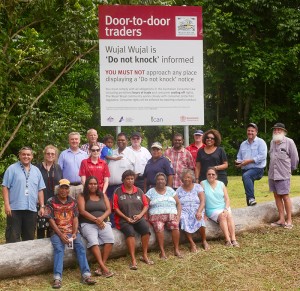 An Australia-first community partnership was launched in Wujal Wujal yesterday with the unveiling of roadside signage designed to minimise consumer harm from unlawful door-to-door trade.
An Australia-first community partnership was launched in Wujal Wujal yesterday with the unveiling of roadside signage designed to minimise consumer harm from unlawful door-to-door trade.
The signage, placed on both entrances into the Far North Queensland Indigenous community, reminds door-to-door traders they have legal obligations to consumers and can’t approach houses displaying do-not-knock notices. It is also hoped that the signage helps to empower Wujal Wujal residents to understand and assert their rights under the Australian Consumer Law.
Speaking from the launch, Wujal Wujal Aboriginal Shire Council Mayor Desmond Tayley welcomed the initiative and said it was expected to provide a powerful reminder to door-to-door traders, who might seek to target the community, of their legal obligations.
“Community members have experienced the worst of this kind of trade in the past and the strong message from the community is that it won’t be tolerated,” Mayor Tayley said.
The signage is a joint initiative between the Australian Competition and Consumer Commission (ACCC), Queensland Office of Fair Trading (QOFT) and the Indigenous Consumer Assistance Network (ICAN).
ACCC Deputy Chair Delia Rickard, who was in Wujal Wujal for the official launch, said the community partnership was an example of the ACCC’s commitment to prioritise Indigenous consumer protection.
“Indigenous consumers, particularly those in remote locations, can face challenges in enforcing their consumer rights, and it is hoped that new initiatives like this will help improve outcomes for Indigenous consumers,” Ms Rickard said.
Fair Trading Executive Director Brian Bauer said door-to-door traders had been a focus of regulator enforcement action in recent years, particularly in Indigenous communities.
“Some disturbing recent matters have involved marketers approaching consumers at home or in public places and using a variety of dodgy tactics to sign them up to training courses,” Mr Bauer said.
ICAN works closely with Indigenous consumers, providing free consumer advice and financial counselling services to communities across Far North Queensland.
ICAN CEO Aaron Davis reinforced the importance of targeted consumer protection initiatives in at-risk Indigenous communities.
“Being on the front-line and seeing the damage shonky door-to-door traders can do – it’s really important that consumers are aware of their rights and are confident help is available when needed,” Mr Davis said.
Consumers are reminded that they have a choice as to whether to allow door-to-door traders to approach their homes. By placing a ‘do-not-knock’ sticker in a visible and prominent place on the home, door-to-door traders must not approach.
Free ‘do-not-knock’ stickers or signs are available from ICAN , ACCC and OFT.
More information on consumer rights is available from www.accc.gov.au or www.qld.gov.au/fairtrading. Indigenous consumers can also call ICAN’s financial counselling support line on 1300 369 878.
******
See further media coverage:
Remote Indigenous community becomes first town to ban door-to-door salespeople
ABC News – April 22, 2016
http://www.abc.net.au/news/2016-04-22/door-to-door-salespeople-warned-off-remote-indigenous-community/7347512
Wujal Wujal becomes official ‘do not knock’ community (Audio)
ABC Radio – April 22, 2016
http://www.abc.net.au/news/2016-04-22/wujal-wujal-becomes-official-‘do-not-knock’/7349044
NITV News (Video) – April 22, 2016
http://www.sbs.com.au/ondemand/video/663031875821/NITV-News-S2016-Ep81
Channel Ten News (Video) – April 22, 2016
http://tenplay.com.au/news/brisbane/2016/4/22/scammers-warned